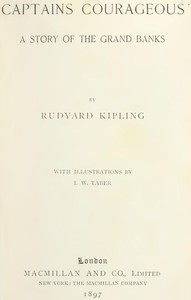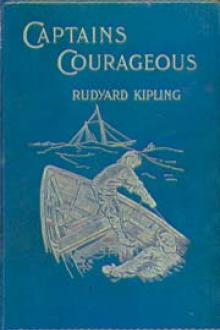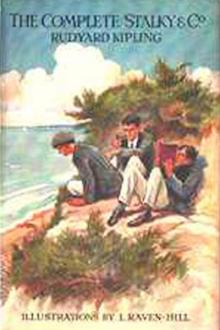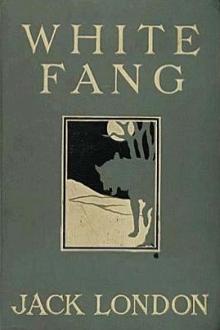"Captains Courageous": A Story of the Grand Banks by Rudyard Kipling (books for 6 year olds to read themselves txt) 📗

- Author: Rudyard Kipling
Book online «"Captains Courageous": A Story of the Grand Banks by Rudyard Kipling (books for 6 year olds to read themselves txt) 📗». Author Rudyard Kipling
There was quite a little bubble at the bows, where some irresponsible Bank current held the dory full stretch on her rope; but they could not see a boat's length in any direction. Harvey turned up his collar and bunched himself over his reel with the air of a wearied navigator. Fog had no special terrors for him now. They fished awhile in silence, and found the cod struck on well. Then Dan drew the sheath-knife and tested the edge of it on the gunwale.
"That's a daisy," said Harvey. "How did you get it so cheap?"
"On account o' their blame Cath'lic superstitions," said Dan, jabbing with the bright blade. "They don't fancy takin' iron frum off of a dead man, so to speak. 'See them Arichat Frenchmen step back when I bid?"
"But an auction ain't taking anything off a dead man. It's business."
"We know it ain't, but there's no goin' in the teeth o' superstition. That's one o' the advantages o' livin' in a progressive country." And Dan began whistling:
"Oh, Double Thatcher, how are you? Now Eastern Point comes inter view. The girls an' boys we soon shall see, At anchor off Cape Ann!"
"Why didn't that Eastport man bid, then? He bought his boots. Ain't Maine progressive?"
"Maine? Pshaw! They don't know enough, or they hain't got money enough, to paint their haouses in Maine. I've seen 'em. The Eastport man he told me that the knife had been used—so the French captain told him—used up on the French coast last year."
"Cut a man? Heave's the muckle." Harvey hauled in his fish, rebaited, and threw over.
"Killed him! 'Course, when I heard that I was keener 'n ever to get it."
"Christmas! I didn't know it," said Harvey, turning round. "I'll give you a dollar for it when I—get my wages. Say, I'll give you two dollars."
"Honest? D'you like it as much as all that?" said Dan, flushing. "Well, to tell the truth, I kinder got it for you—to give; but I didn't let on till I saw how you'd take it. It's yours and welcome, Harve, because we're dory-mates, and so on and so forth, an' so followin'. Catch a-holt!"
He held it out, belt and all.
"But look at here. Dan, I don't see—"
"Take it. 'Tain't no use to me. I wish you to hev it."
The temptation was irresistible. "Dan, you're a white man," said Harvey. "I'll keep it as long as I live."
"That's good hearin'," said Dan, with a pleasant laugh; and then, anxious to change the subject: "Look's if your line was fast to somethin'."
"Fouled, I guess," said Harve, tugging. Before he pulled up he fastened the belt round him, and with deep delight heard the tip of the sheath click on the thwart. "Concern the thing!" he cried. "She acts as though she were on strawberry-bottom. It's all sand here, ain't it'?"
Dan reached over and gave a judgmatic tweak. "Holibut'll act that way 'f he's sulky. Thet's no strawberry-bottom. Yank her once or twice. She gives, sure. 'Guess we'd better haul up an' make certain."
They pulled together, making fast at each turn on the cleats, and the hidden weight rose sluggishly.
"Prize, oh! Haul!" shouted Dan, but the shout ended in a shrill, double shriek of horror, for out of the sea came—the body of the dead Frenchman buried two days before! The hook had caught him under the right armpit, and he swayed, erect and horrible, head and shoulders above water. His arms were tied to his side, and—he had no face. The boys fell over each other in a heap at the bottom of the dory, and there they lay while the thing bobbed alongside, held on the shortened line.
"The tide—the tide brought him!" said Harvey, with quivering lips, as he fumbled at the clasp of the belt.
"Oh, Lord! Oh, Harve!" groaned Dan, "be quick. He's come for it. Let him have it. Take it off."
"I don't want it! I don't want it!" cried Harvey. "I can't find the bu-buckle."
"Quick, Harve! He's on your line!"
Harvey sat up to unfasten the belt, facing the head that had no face under its streaming hair. "He's fast still," he whispered to Dan, who slipped out his knife and cut the line, as Harvey flung the belt far overside. The body shot down with a plop, and Dan cautiously rose to his knees, whiter than the fog.
"He come for it. He come for it. I've seen a stale one hauled up on a trawl and I didn't much care, but he come to us special."
"I wish—I wish I hadn't taken the knife. Then he'd have come on your line."
"Dunno as thet would ha' made any differ. We're both scared out o' ten years' growth. Oh, Harve, did ye see his head?"
"Did I'? I'll never forget it. But look at here, Dan; it couldn't have been meant. It was only the tide."
"Tide! He come for it, Harve. Why, they sunk him six mile to south'ard o' the Fleet, an' we're two miles from where she's lyin' now. They told me he was weighted with a fathom an' a half o' chain-cable."
"Wonder what he did with the knife—up on the French coast?"
"Something bad. 'Guess he's bound to take it with him to the Judgment, an' so—What are you doin' with the fish?"
"Heaving 'em overboard," said Harvey.
"What for? We sha'n't eat 'em."
"I don't care. I had to look at his face while I was takin' the belt off. You can keep your catch if you like. I've no use for mine."
Dan said nothing, but threw his fish over again.
"'Guess it's best to be on the safe side," he murmured at last. "I'd give a month's pay if this fog 'u'd lift. Things go abaout in a fog that ye don't see in clear weather—yo-hoes an' hollerers and such like. I'm sorter relieved he come the way he did instid o' walkin'. He might ha' walked."
"Do-on't, Dan! We're right on top of him now. 'Wish I was safe aboard, bein' pounded by Uncle Salters."
"They'll be lookin' fer us in a little. Gimme the tooter." Dan took the tin dinner-horn, but paused before he blew.
"Go on," said Harvey. "I don't want to stay here all night."
"Question is, haow he'd take it. There was a man frum down the coast told me once he was in a schooner where they darsen't ever blow a horn to the dories, becaze the skipper—not the man he was with, but a captain that had run her five years before—he'd drownded a boy alongside in a drunk fit; an' ever after, that boy he'd row alongside too and shout, 'Dory! dory!' with the





Comments (0)